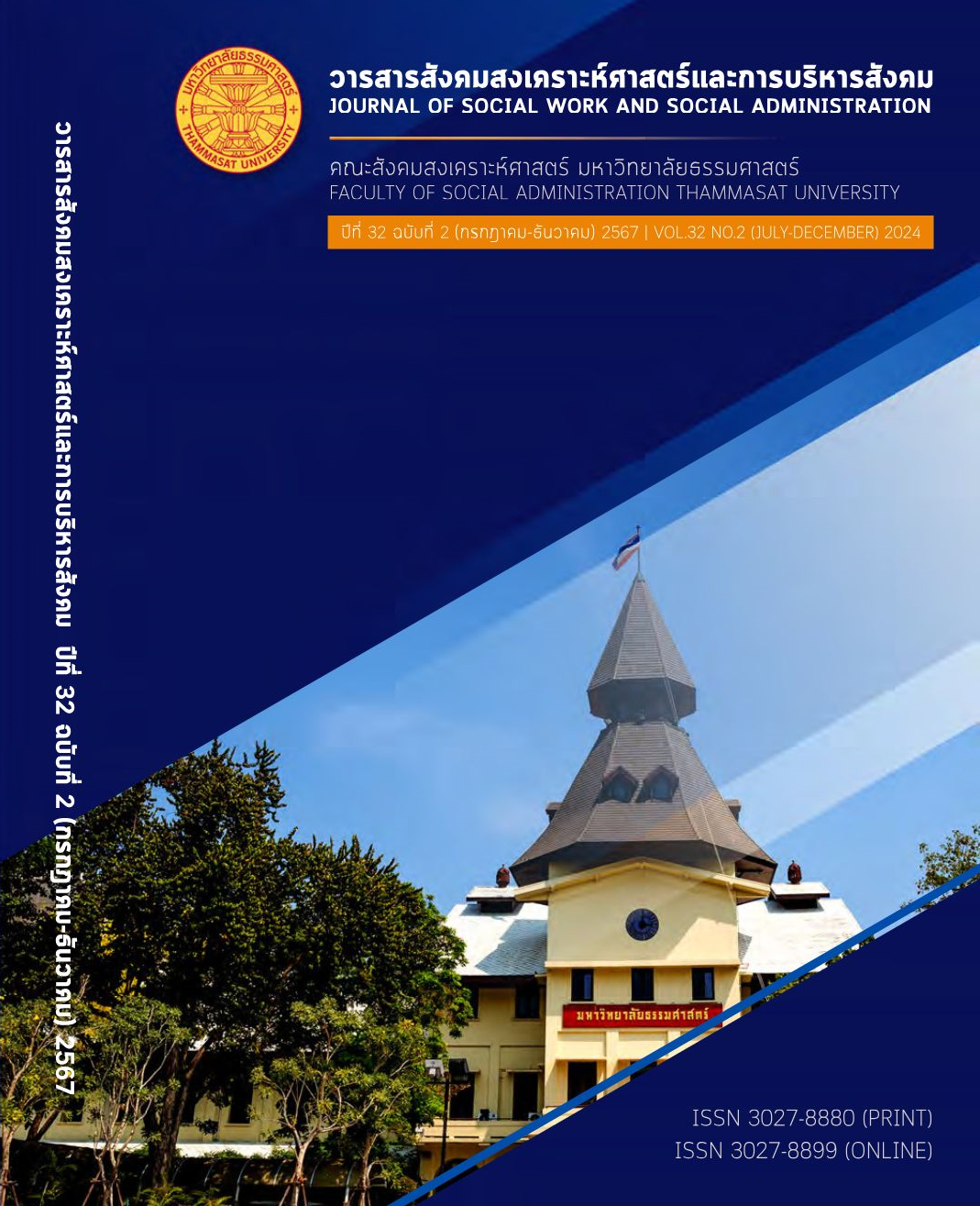The Development of Protecting Elderly Persons’ Rights in Protection Home for the Destitute
Keywords:
Protection home for the destitute, Elderly persons in protection home for the destitute, Elderly Thai persons, Rights of the elderly in protection home for the destituteAbstract
The purpose of this research is to examine the protection and access to rights for the elderly and those approaching old age (50 years and above) in Protection Centers for the Destitute. Additionally, it aims to develop guidelines for improving rights protection and to propose policies for this demographic within these centers. Quantitative data were collected from 919 clients aged 50 and above from 6 Protection Centers for the Destitute, while qualitative data were gathered from 69 informants through in-depth interviews, focus group discussions, and exchange forums. The findings revealed that: (1) Protection Centers for the Destitute are experiencing an intensely aging population, with over 28 percent of users being 60 years or older, highlighting the inadequacy of current services tailored specifically for elderly users; (2) The format and access to rights for service users are primarily protected as "destitute people," with significant gaps in protection specific to "elderly people"; (3) Guidelines for improving rights protection for the elderly in shelters include: (a) legal improvement and enforcement measures, (b) integration of cooperation among various agencies with an elderly-centric approach, and (c) specific rights protection services for the elderly in shelters. (4) Policy recommendations include: (a) enhancing the protection of rights for destitute elderly individuals to ensure they live with dignity and human value, and (b) preventing elderly individuals from entering shelters by promoting self-reliance and quality living within their communities under the concept of aging in place. This research underscores the urgent need for tailored services and policies that address the unique needs of the elderly in destitute conditions, ensuring their rights and dignity are upheld.
References
กรมพัฒนาสังคมและสวัสดิการ. (2561). คู่มือทีมสหวิชาชีพเพื่อการคุ้มครองคนไร้ที่พึ่ง. กรุงเทพฯ: กระทรวงการพัฒนาสังคมและความมั่นคงของมนุษย์.
กรมพัฒนาสังคมและสวัสดิการ. (2565). สถานการณ์ผู้ใช้บริการในสถานคุ้มครองคนไร้ที่พึ่ง. กรุงเทพฯ: กระทรวงการพัฒนาสังคมและความมั่นคงของมนุษย์.
กุลธิดา รุ่งเรืองเกียรติ (แปล). (2565). 100 นวัตกรรมสร้างฟินแลนด์. Taipale, I. (บรรณาธิการ). กรุงเทพฯ: มูลนิธิก้าวหน้า.
ณปภัช สัจนวกุล, ณัฐนี สัจนวกุล, นุชราภรณ์ เลี้ยงรื่นรมย์, ปัณณวัฒน์ เถื่อนกลิ่น, ณัฐณิชา ลอยฟ้า, ประทีป นัยนา, สุรีย์พร พันพึ่ง และ ปราโมทย์ ประสาทกุล. (2565). เอกสารสรุปการวิจัย (Research Brief) เรื่องการสูงวัยในถิ่นที่อยู่ ข้อเสนอตัวแบบนโยบายจากบทเรียนต่างประเทศ. นครปฐม: มหาวิทยาลัยมหิดล, สถาบันวิจัยประชากรและสังคม.
ณัฐนี อมรประดับกุล, ณปภัช สัจนวกุล และ ปัณณวัฒน์ เถื่อนกลิ่น. (2563). นโยบายที่อยู่อาศัยสำหรับผู้สูงอายุ: ประวัติศาสตร์และบทเรียนจากแนวปฏิบัติที่ดีในต่างประเทศ. นครปฐม: มหาวิทยาลัยมหิดล, สถาบันวิจัยประชากรและสังคม.
ธีรนงค์ สกุลศรี และ วัชรา ริ้วไพบูลย์. (2566). การเปลี่ยนผ่านเส้นทางชีวิตของผู้สูงวัยสู่ที่อยู่อาศัยเชิงสถาบัน ด้วยแนวคิดสูงวัยในถิ่นที่อยู่อาศัยเดิม (Aging in Place) หลากมิติในหนึ่งชั่วชีวิต. งานประชุมวิชาการระดับชาติ ครั้งที่ 17 “ประชากรและสังคม 2566 หลากมิติ หนึ่งชั่วชีวิต”. นครปฐม: มหาวิทยาลัยมหิดล, สถาบันวิจัยประชากรและสังคม.
ประไพพิมพ์ สุธีวสินนนท์ และ ประสพชัย พสุนนท์. (2559). กลยุทธ์การเลือกตัวอย่างสำหรับการวิจัยเชิงคุณภาพ. วารสารปาริชาต มหาวิทยาลัยทักษิณ, 29(2), 31-48.
ปราโมทย์ ปราสาทกุล และ ณปภัช สัจนวกุล. (2564). ความจำเป็นของการสูงวัยในที่อยู่อาศัยเดิมในประเทศไทย. วารสารธรรมศาสตร์, 40(2). 1-23.
ภีมกร โดมมงคล. (2562). การคุ้มครองสิทธิและการเข้าถึงความยุติธรรมของคนไร้ที่พึ่งในสถานคุ้มครองคนไร้ที่พึ่ง. วารสารสังคมสงเคราะห์ศาสตร์, 27(1), 158-191.
รุ่งนภา เทพภาพ. (2565). นวัตกรรมการสังคมรองรับสังคมผู้สูงอายุ: ประสบการณ์ของประชาสังคมไทย. เชียงใหม่: โรงพิมพ์เดอะ พริ้นท์ ไอเดีย.
วรรณลักษณ์ เมียนเกิด (2562). รายงานวิจัยผู้สูงอายุในสถานคุ้มครองคนไร้ที่พึ่ง. กรุงเทพฯ: มูลนิธิสถาบันวิจัยและพัฒนางานผู้สูงอายุไทย และ สำนักงานการวิจัยแห่งชาติ.
สุจิตรา บุณยรัตพันธุ์. (2534). ระเบียบวิธีวิจัยทางรัฐประศาสนศาสตร์. กรุงเทพฯ: สถาบันบัณฑิตพัฒนบริหารศาสตร์.
สุธิดา แจ้งประจักษ์ และ พิชาย รัตนดิลก ณ ภูเก็ต. (2566). พัฒนาการนโยบายผู้สูงอายุไทย: การปรับเปลี่ยนกระบวนทัศน์ของนโยบาย. วารสารการเมืองการปกครอง, 13(1). 46-62.
Dong, D., Cai, Q., Zhang, Q. Z., Zhou, Z. N., Dai, J. N., Mu, T. Y., Xu, J. Y., & Shen, C. Z. (2021). Dignity and its related factors among older adults in long-term care facilities: A cross-sectional study. International journal of nursing sciences, 8(4), 394–400. Retrieved from https://doi.org/10.1016/j.ijnss.2021.08.003
Gallagher, A., Curtis, K., Dunn, M., & Baillie, L. (2017). Realising dignity in care home practice: An action research project. International Journal of Older People Nursing, 12, e12128. Retrieved from https://doi.org/10.1111/opn.12128
Hall, S., Dodd, R. H., & Higginson, I. J. (2014). Maintaining dignity for residents of care homes: A qualitative study of the views of care home staff, community nurses, residents and their families. Geriatric Nursing, 35(1), 55–60. Retrieved from https://doi.org/10.1016/j.gerinurse.2013.10.012
Wachholz, P., & Giacomin, K. (2023). Dignity in the care of older adults living in nursing homes and long-term care facilities. F1000 Research, 11, 1208. Retrieved from https://doi.org/10.12688/f1000research.126144.3
WHO. (2011). World Report on Disability 2011. Retrieved from https://www.who.int/teams/noncommunicable-iseases/sensory-functions-disability-and-rehabilitation/world-report-on-disability
Downloads
Published
How to Cite
Issue
Section
License
Copyright (c) 2024 Journal of Social Work and Social Administration

This work is licensed under a Creative Commons Attribution-NonCommercial-NoDerivatives 4.0 International License.
The manuscripts published in the Social Work Journal is the copyright of the Social Work Journal, Thammasat University
Any article or opinion appeared in the Social Work Journal will solely be under the responsibility of the author The Faculty of Social Administration, Thammasat University and the editors do not need to reach in agreement or hold any responsibility.



